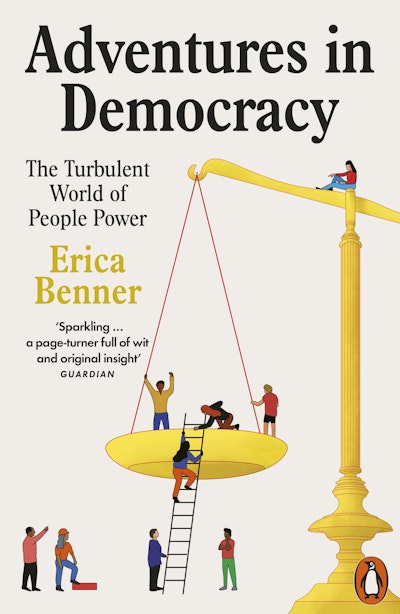- Published: 6 May 2025
- ISBN: 9781802061444
- Imprint: Penguin Press
- Format: Paperback
- Pages: 224
- RRP: $30.00
Adventures in Democracy
The Turbulent World of People Power
- Published: 6 May 2025
- ISBN: 9781802061444
- Imprint: Penguin Press
- Format: Paperback
- Pages: 224
- RRP: $30.00
An invigorating reflection on the tensions in liberal democracy. Benner weaves together personal reflections on life in Japan and Eastern Europe with a nuanced account of ancient philosophies that are all too often caricatured. Essential reading for anyone tempted to be complacent about the survival of democracy in the twenty-first century
Catherine Fletcher, author of The Beauty and the Terror
Shows how ancient wisdom might save democracies from anarchy and ruin . . . That she has lived and taught the ideas she writes about gives the book an enjoyable vitality
Emma Duncan, The Times
A sparkling account of people power through the ages, and how to save it from itself . . . a page-turner full of wit, original insight and unassuming erudition . . . a timely reminder that we can all play our part
Katja Hoyer, Guardian
A lively, accessible account of democracy, its strengths and weaknesses over the past 2,500 years . . . it comes with a plea to throw out the self-satisfied view that western democracy is a kind of political perfection, and to bring more honesty to our conversations about the ideal versus the reality of modern democracy
Michael Foley, The Irish Times
Highly stimulating . . . wonderfully readable . . . wherever she darts in history, Benner is a terrific guide, always questioning, always teasing out parallels . . . she brings clarity and curiosity to each issue . . . and a deep understanding of the past . . . her analysis of democracy's key strengths and weaknesses is forensic
Sarah Dunant, Literary Review
Engaging, illuminating, and arrives at an opportune moment. . . An overriding concern is that though democratic norms encourage us to love equality, we tend to want more of it for ourselves than for the rest
Sanjay Sipahimalani, The Federal
Erica Benner lends a personal, familiar touch to a difficult, layered subject. The tone of the narrative and how the chapters unfold are riveting — it is almost as if Benner is sitting down to have a meal with you and engaging in a frank, informal discussion about…democracy, its "beginnings and myths", the "constant struggles" it has faced over the years and the "mortal dangers" it suffers today
Telegraph India
Political philosopher Erica Benner offers an original, highly humanistic analysis focusing on how individuals have interacted organically with democracy…Benner forensically dissects the strengths and failings of democracy... She offers — in a beautifully written account — instructive lessons about the compromises and contradictions that democratic systems have had to grapple with and the questions that informed citizens must ask themselves when considering their political futures
John Nilsson-Wright, Global Asia
An enjoyable dive into political philosophy... an unusually accessible gut punch of a book... Erica Benner takes readers on a journey across the ages... to explore what happens when the core ideas of democracy are subverted by demagogues and self-absorbed citizens
Matthew Jones, Survival



